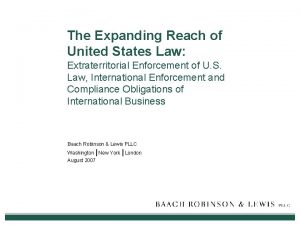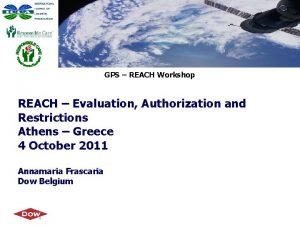Chapter 7 THE EXTRATERRITORIAL REACH OF U S









- Slides: 9

Chapter 7 - THE EXTRATERRITORIAL REACH OF U. S. LAW Part II

(Kiobel Continued) The Extra-Territorial Reach of the ATS • Had historically been used against pirates. • Pirates have no nationality and operate outside territorial waters, so suing them or killing them does not interfere with the sovereignty of any state. • Suing foreign nationals for actions in foreign countries does interfere with the sovereignty of other nations.

The Kiobel Ruling • We therefore conclude that the presumption against extraterritoriality applies to claims under the ATS, and that nothing in the statute rebuts that presumption. “[T]here is no clear indication of extraterritoriality here, ” Morrison, 561 U. S. , at _____, and petitioners’ case seeking relief for violations of the law of nations occurring outside the United States is barred. • On these facts, all the relevant conduct took place outside the United States. And even where the claims touch and concern the territory of the United States, they must do so with sufficient force to displace the presumption against extraterritorial application. Corporations are often present in many countries, and it would reach too far to say that mere corporate presence suffices. If Congress were to determine otherwise, a statute more specific than the ATS would be required.

Is There Anything Left of the ATS? • Foreign cubed – no action under the ATS • Cardona v. Chiquita Brands Int’l, Inc. , • Foreign plaintiffs sued an American corporation under the ATS for conduct in the United States that supported terrorist attacks abroad that injured the plaintiffs. • Company allegedly engaged in concerted action with paramilitary forces in Colombia, including acts that plaintiffs alleged to constitute torture and to have resulted in personal injury and death. • Chiquita is a US corporation, but the court found that none of the actions that occurred in the US counted as a tort.

Al Shimari v. CACI • Al Shimari v. CACI was based on actions that CACI claimed were directed by the US government. • The ATS was involved because it was foreign nationals on foreign soil. • The case was allowed to go forward because the court found that the defendants were American citizens employed by an American company with headquarters in the US. • This would meet traditional tests for minimum contacts for federal jurisdiction.

Congressional Jurisdiction to Regulate a Particular Extraterritorial Activity • While there are international law standards for judging the right of a state to legislate exterritorialy, the Supreme Court does not find these binding on the US. • The Court has not struck down laws that Congress passed with extraterritorial reach. • Since Congress has not been aggressive with passing these laws, the Court has not faced a case that would challenge international law norms.

THE EXTRATERRITORIAL REACH OF U. S. LAW: SUMMARY OF BASIC PRINCIPLES • The Constitution applies abroad to protect citizens, and also to protect aliens who have a substantial connection to the United States. • Constitutional protections do not, however, necessarily apply in every particular in every foreign place, even to a citizen or qualifying alien. The scope of its application may depend on pragmatic and political concerns, although the Supreme Court has so held only with respect to the right to petition for a writ of habeas corpus.

THE EXTRATERRITORIAL REACH OF U. S. LAW: SUMMARY OF BASIC PRINCIPLES • There is a presumption against extraterritorial application of a statute. This presumption is a canon of statutory construction, not a limit on congressional legislative power. • The presumption may be rebutted by express statutory language asserting extraterritorial effect. It also may be rebutted by implication from the text, context, and purpose of a statute, or, more narrowly, according to Justices Alito and Thomas, from the “focus of the statute. ”

THE EXTRATERRITORIAL REACH OF U. S. LAW: SUMMARY OF BASIC PRINCIPLES • Although a statute may trump international law, and Congress is free to give extraterritorial effect to a law even in violation of international norms, our laws are construed to avoid conflict with such norms if possible. • Under international law, Congress may prescribe regulations for activities abroad if the regulations satisfy one of five principles reflecting the legitimate sovereign interests of the United States. If they are consistent with one or more of these principles, they also must be reasonable in the circumstances.

















